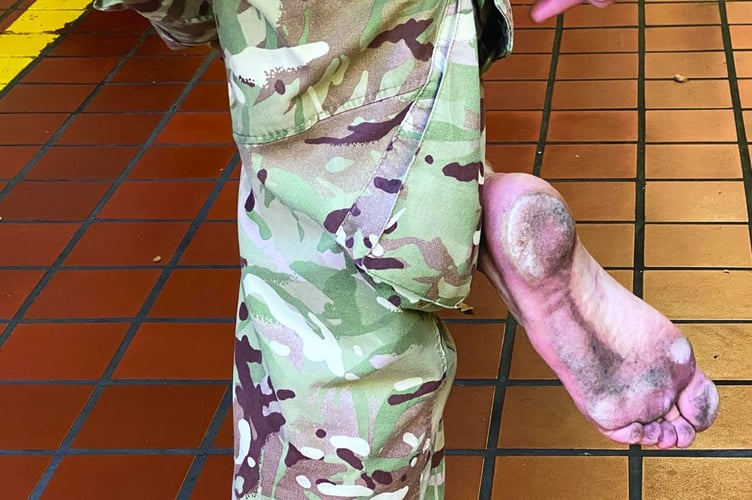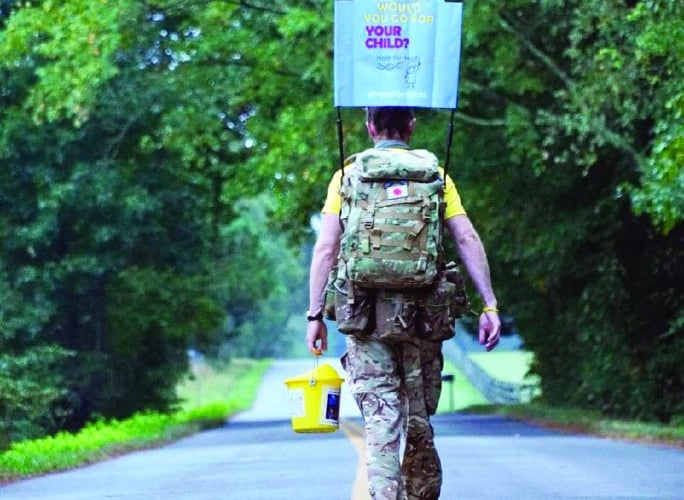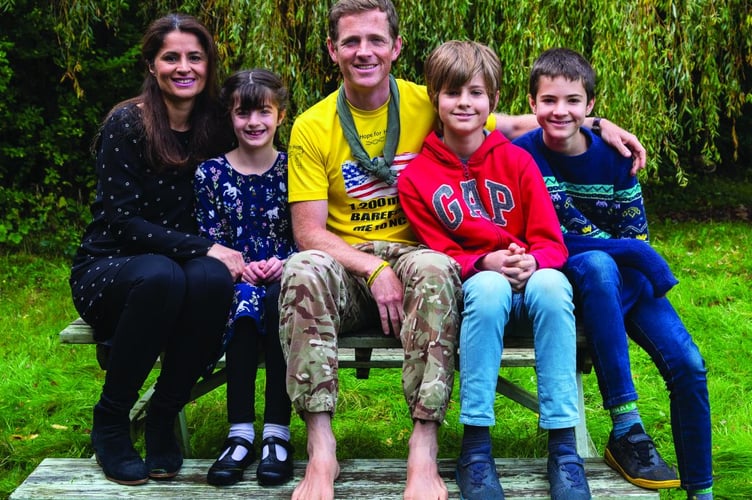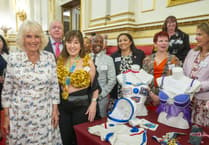MORE than £1 million has been raised by Barefoot Soldier Chris Brannigan and his supporters during a second long-distance walk to fund research into his daughter’s rare condition.
Army major Chris returned home to Byfleet after completing a 1,000-mile sponsored trek in the US which alone attracted more than £800,000 in online donations.
He collected more than £90,000 from well-wishers during his shoeless trek and dozens of people have taken part in sponsored feats and held events for the Hope for Hasti charity to raise many thousands of pounds more.
Chris walked for 45 days without shoes down the east coast of America, on another walk to support research and an eventual therapy for the disease suffered by nine-year-old Hasti.
Going barefoot helped raise the profile of a fundraising campaign that has competed with the coronavirus pandemic, claiming huge amounts of coverage in the news media.

“I’ve had people of all sorts helping me along the way and have made some fantastic contacts,” he told the News & Mail. “People were very welcoming, looking after me and making donations.
“In the short term I’m looking forward to spending some time with my family but there is a lot more to do as we carry on our campaign to find a treatment for Hasti.”
Hasti has Cornelia de Lange Syndrome (CdLS), a condition that causes reduced growth and various other development problems. The disorder occurs just once in 20,000 births and there is currently no treatment for it.
Chris, 41, had some time to relax with his family – his wife Hengameh, Hasti and sons Amir, 14, and Navid, 12 – before resuming his job with the Army today (1 November).
He was nursing feet that suffered countless cuts, bruises and injuries on 45 days of walking through 12 states. Ankle, back and neck injuries also flared up on the way.
Much of the journey was on country roads but he also walked through big cities including Boston, New York and Washington DC. Glass and metal fragments on the road contributed to his injuries and rural hazards to be avoided included skunks killed by vehicles.

Chris originally intended to walk 1,200 miles, to Jacksonville in North Carolina, but decided to finish early because Hasti needed hospital treatment in the week before he was due to end the walk.
“As an Army family that moves home frequently we have little support structure around us,” he said. “Having one child in hospital and two others to still cope with was too much for Hengemeh to handle while I was overseas walking. In short, being overseas was leaving us very exposed as a family.”
His finishing line was a ribbon strung across the entrance to a fire station in Raleigh. He had intended to camp out along his route but fire crews along the route were among the many that provided food, washing facilities and a bed for the night.
“One thousand miles is certainly a long way to walk, but it has been just a single step in our larger journey, a step that I could never have taken without support,” he said on his final day. “Thank you so much to everyone for helping Hengameh and I to make the impossible possible for my little girl.
“We asked family, friends and strangers for help to raise the huge sums of money needed for the project.
“Thankfully, we have not had to do it alone. From the very first day, we have had at our side an army of volunteers.”
Donations to the charity can be made at www.justgiving.com – search for Hope for Hasti.
Making progress for new research

CHRIS, who raised more than £500,000 on a 700-mile barefoot walk in the UK last year for the charity, started his US trek at a laboratory in Maine that is making progress in developing a gene therapy that will help people with CdLS live a more comfortable life.
He said he had made new connections with other experts on the way to his finishing point in Raleigh, the capital of North Carolina. Families of children that also suffer from CdLS came out along the way to lend their support and make donations.
“I made some good contacts with experts who can join the ongoing effort to find a treatment. Our intention is to arrange a conference for next year where we can bring people together to help co-ordinate the research.”
Chris said there are no CdLS specialists in the UK and few for other rare diseases. “One in 17 people will suffer from a rare condition in their lives, so our focus isn’t just on CdLS,” he said.




